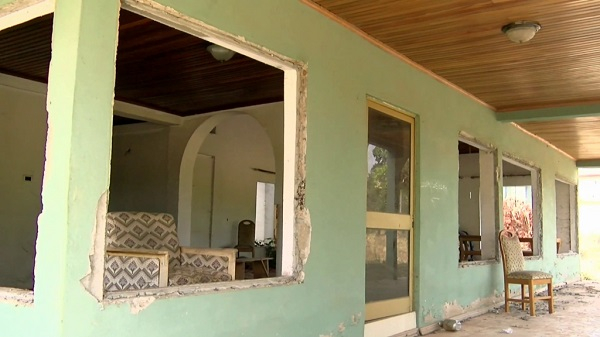Obscene VIDEOS from Senior High schools a wake up call for teachers to enforce discipline

I have seen two viral videos emanating from two Senior High Schools within this week and the contents are very obscene and not fit for public consumption. In one of the videos that have gone viral, some of Ejisuman Senior High School students made a video recording and said among others that a lady must have a guy who pays and a guy with who she would have sex. ‘If you’re a lady and you take a guys money and you deny him sex, you are mad or there is something wrong with you. They continued that, You should rather allow the guy to have sex with you to the extent, you feel it in your heart that the guy has fucked you’. In this said viral video, there are six girls whose faces are visibly seen in the video when the viral video was recorded and shared via social media.
Another viral video has also be seen circulating on social. This time it is coming from some uncouth students of the Kwegyir Aggrey Senior High School at Anomabu. In this video, one of the girls is seen saying, “ok the girls who have been covering their faces with virginity, allow them to have sex with you, if you die it would be eaten by insects, what is a vagina? Allow the boys to sleep with you small, allow them to have a taste of you, what is wrong with it? In this era where there is an overabundance of postinor 2. Are the ladies saying they haven’t heard about it, aah”? In this video, there were four girls seen in it.
When the above issues came up, the school authorities of the Ejisuman Senior High School have acted and a story caption “Ejisuman SHS: Seven Students Expelled From Boarding House Over Viral Video” appeared on peacefmonline.com. The story is reported that the authorities at the Ejisuman Senior High School in the Ashanti Region have deboardinised seven female students from the school after they allegedly posted a video on social media that contained sexual and obscene language. According to authorities, the video which has gone viral has dented and impugned the image of the school, hence their action.
A letter announcing the punishment against the students and which was addressed to the Ashanti Regional Directorate of the Ghana Education Service stated that: “the management of the school at a meeting with the affected students and their parents arrived at that decision”. The seven who are all final year students have been accused of using a mobile phone – which is prohibited in basic and high schools – to upload a video on social media where unprintable words that border on sex were spewed out. The sanction took effect from February 6, 2020. This action by the school authorities has elicited a wide range of reactions from different people from different fields and backgrounds.
The editor of the Insight Newspaper Kwesi Pratt Jr, reacting to this issue on Peace FM said the girls should have been disciplined in the school and taken through counseling instead of deboardinisation. In his view, there was a possibility that some of the family settings from where the young girls in the viral video hail from, might not be conducive enough to bring the much-needed change or transformation in their lives; hence they should have been kept in the school. This in my view would have been the ideal situation if the girls were not in their final year but what Mr. Pratt didn’t aver his mind to was the fact that, the girls have broken two rules or code of conduct of the Ghana Education Service (GES) governing the senior schools. The first; being the usage of the unauthorised gadget (mobile phone) in school and second, using same device to record a video which has gone viral and also tainted the school’s image. What punishment would he have deemed to be appropriate under the circumstance? Which disciplinary measure would he have deemed appropriate? What are the accompanying punishment allowable by GES in such a situation?
According to a story published on February 11, 2020 on adomonline.com and titled “Allotey Jacobs equates sex talk in Ejisuman SHS viral video to Eves love words to Adam”, it states that, the former Central Regional Chairman of the National Democratic Congress, Bernard Kojo Allotey Jacobs, has equated the sex talk by the seven female students of Ejisuman Senior High School (SHS) in the viral video to love words told Adam by Eve in the Garden of Eden. He explained that, the young ladies become civilized when they break their virginity, and the behaviour put up by the girls in the video was to exhibit their civility”.
He continued that what these female students said in the viral video was the same thing Eve told Adam in the garden when she deceived Adam into eating the apple. In Ghana, any girl who breaks her virginity is seen as civilised, so dont blame them. This is very problematic for me. Because what is Mr. Jacobs alluding to as civility? That, when some recalcitrant students who clearly have exhibited an uncouth behaviour by recording obscene video using intemperate language, is that what he refers to as civility? Assuming they have all broken their virginity, is that civility in our parlance? It clearly shows a breakdown of our moral fibre and how defective child training has become over the years.
She further explained that “this is a school that historically has had an issue in 2017 and they have to be seen to be doing something and so for form three students, they had to deal with it differently. It shouldn’t even have gotten to this point because when they are in school and are properly monitored, how were they able to get those phones in and quite confidently talk on the phone for a minute and a half and also be brave enough to upload this information meaning they were’nt too scared about the consequences” (citinewsroom).
This is what normally happens in various Senior High Schools across the country. When students get to form three, they tend to feel on top of the world and disregard the rules and regulation that governs their activity on campus. Some even openly show gross misbehaviour towards their teachers. This in my humble view has been compounded by the so called rights activism in our country and the banning of caning in our various schools.
On March 3, 2017 there was a story on graphic online captioned “Corporal punishment is illegal – GES warns”. The Ghana Education Service (GES) has warned teachers, educational workers and staff of private and public educational institutions who resort to corporal punishment to cease, because corporal punishment in public and private schools is illegal and will not be countenanced in any form. The story continued that, the Director-General of the GES, Mr Jacob Kor warned henceforth, any GES/private school staff who inflicts corporal punishment on any child in our schools will be dealt with per the policy guidelines of the service and subsequently referred to the appropriate institution to deal with it” (www.graphic.com.gh).
The statement issued by the GES Director General further explained that, the directive was in line with the United Nations Convention on the Right of the Child (CRC), which was ratified by Ghana in 1990 and the Children’s Act of 1998 (Act 560). The statement concluded that we strongly advise that teachers, educational workers and staff of public and private educational institutions should continue to exhibit the best professional conduct throughout the entire process of educational service delivery to pupils and students, without having to resort to corporal punishments”.
Corporal punishment is a form of physical punishment that involves the deliberate infliction of pain as retribution for an offence, or for the purpose of disciplining or reforming a wrongdoer, or to deter attitudes or behaviour deemed unacceptable. The term usually refers to methodically striking the offender with an implement or the open hand or whether in judicial, domestic, or educational settings. Corporal punishment is defined by the UN Committee on the Rights of the Child as: any punishment in which physical force is used and intended to cause some degree of pain or discomfort, however light” (www.definitions.net).
Corporal punishment may be classified into three main types:
1. Parental or Domestic Corporal Punishment: this normally happens within the family where typically, children are punished by parents or guardians. It may take the form of the following: slapping the child with an open hand or striking with an implement such as a cane, slipper, belt, hairbrush or paddle, hanger, and can also include pinching, shaking, forced ingestion of substances, or forcing children to stay in uncomfortable positions or spanking.
2. School Corporal Punishment: this happens within schools system, when students are punished by teachers or school administrators, or, in the past, master craftsmen could punish apprentices.
3. Judicial Corporal Punishment: this is part of a criminal sentence ordered by a competent court of law. Is the infliction of corporal punishment as a result of a sentence by a court of law. The punishments may include caning, whipping, bastinado, birching, or strapping. Corporal punishment is also still allowed in some military settings, and banned in others.
From the above definitions and types of corporal punishment, it the school types that has been banned from our schools. This has contributed to all these viral videos going round on social media and raising eyebrows. Redrawing of caning from our schools has emboldened students while it has weakened the strength and supervisory power of the teacher.
Speaking to a friend who is a teacher at Wesley Girls School in Cape Coast, Mr. George William Mante, he explained the processes through which a teacher can cane a student. He said, the teacher must log the offence of the student, the number of strokes s/he is willing to give, the headmaster must approve same, and after the canning the teacher must log the reaction of the students: whether s/he cried, the time and date. This to me is too cumbersome and that has rendered teachers very ineffective in exacting discipline in our various campuses.
Chapter 5 of our 1992 constitution and article 25 (1) to be precise states, “all persons shall have the right to equal educational opportunities and facilities and with a view to achieving the full realisation of that right – (a) basic education shall be free, compulsory and available to all; (b) secondary education in its different forms, including technical and vocational education, shall be made generally available and accessible to all by every appropriate means, and in particular, by the progressive introduction of free education”.
But with these rights notwithstanding, canning has been part and parcel of our educational system even when we had ratified the Nations Convention on the Right of the Child (CRC). So when did this cumbersome nature through which teachers have been subjected to just to exact correctional punishment to erring students come to be very much entrenched in our schools?
This particular situation has made most teachers to be apathetic to the course of disciplining students. They claim they are unwilling to go through the process of canning a student and as such would prefer to leave the students to their fate apart from teaching. The teachers claim should you discipline a student by canning and should any matter come up, the teacher would be left to his or fate. Why didn’t we domesticate the UN CRC to suit our peculiar situation as has been tried and tested over time? The abuse of the cane by some few bad teachers ought not to have been the bases for this drastic policy which is affecting our teachers in our various schools.
Reacting to the Ejisuman deboardinization of 7 students, lawyer Maurice Ampaw has called for stiffer punishments for the seven female students of Ejisuman Senior High School who have been dismissed. Speaking on GBC Radio Central on our Morning Show on the 12th of February, 2020, he said, the students must be invited by the Domestic Violence and Victim Support Unit of the Ghana Police Service to face criminal trials for engaging and also promoting obscene behaviour as well as exposing and promoting sexual impunity and immorality and charge them with same. According to lawyer Ampaw, the behaviour of the girls has the tendency to morally affect other girls whose parents have tried to bring them up well and as such must be taken through the process, charge and fined, their parents are made to pay and that serves as a deterrent to others who might want to tow a similar line. He continued that, other parents would caution their children to be of good referencing the punishment given to theses 7 girls.
The girls are above the age of 13 years so they have criminal liabilities. If a child commits a crime, it is a crime. These girls have engaged in offenses against the public morals and obscenity, let the law take its course. Forget about whether or not they are preparing for their final year (Ampaw, 2020).
Defending his claim, Lawyer Ampaw cited Chapter 7 of the Criminal Offences Act which notes that it is an offence against public moral and Section 280 of the Criminal Offence Act, which states that any person who publishes any material or incites obscene behaviour is guilty of an offence against public moral and Section 280 of the Criminal Offence Act, which states that any person who publishes any material or incites obscene behaviour is guilty of an offence.
After the interview with lawyer Ampaw, a national service personnel (Lillian Maame Adwoa Ahorgba) recounted her experience and why she is in support that stiffer punishment must be meted out the 7 girls of Ejisuman. She said when she was in her final year, she was the close confidante of their senior house mistress. She continued that, an exercise was conducted at the female dormitories and a lot of phones were seized from students. Her three friends prevailed upon her to pick up their phones from the house mistress room for them, which she did. She said she only found her name on the school’s notice board and accused of theft. She faced the disciplinary committee of the school, was later found guilty, given two weeks internal suspension, made to scrub, wash pantry bowls, weed, sweep, stripped of her school entertainment prefect ship and above all she and her friends were paraded at the school main assembly and reprimanded. In all these her senior house mistress friend never interceded. She added that with ever since she has learnt to act aright and never take anything for granted. With this experience she said “deboardnising the girls wasn’t enough and they should have been indefinitely suspended from the school to serve as a deterrent to others”.
Even though the behaviour of the girls have dented the image of Ejisuman Senior High School, some NGO’s are against the punishment of deboardinisation and describing same as inappropriate. But, lawyer Ampaw disagrees and said “Child Right International, Amnesty International, all they do is to advocate for right, even when it is wrong”.
In today’s Ghana, we have collapsed the dignity of the teacher to the extent that some parents can go and attack a teacher just because s/he might have disciplined their ward or done something to their ward which they find untoward. Since when did our society sink to the moral abyss this way?
The teacher who is at the centre of teaching, learning and instilling some moral values into our students has now become a laughing stock to students. These and other things have militated against the teacher but Ghana National Association of Teachers (GNAT), National Association of Graduate Teachers ( NAGRAT) and other teacher unions are silent on some of these happening and that irks me. They should lead in the crusade against policies that prevents them from discharging their duties creditably and well-meaning citizens would support them. It should not be that their voices are only heard when it is about allowances and salary increment that government has not paid yet or has delayed payment.
In sum, in as much as I can agree with the advocacy for rights, such advocacy should be tailored to suit our socio-cultural ethos as a people. We cannot be overemphasized on rights at the expense of responsibilities. To what extent do we want to expand the frontiers of rights for our children?
With regards to the other video circulating that emanated from the Kwegyir Aggrey Senior High School at Anomabu, the least said about it, the better because colleagues who have gone there have said that headmaster was unwilling to speak to the issue. However, some checks revealed that the girls involved have been given an internal suspension and be made to do all of the manner of chores on campus as a form of punishment.
I sincerely think that the teacher should be given a lot of power to be able to control their students. In this era of Free Senior High School and the increase in enrollment, teachers must be strengthened to discharge their duties creditably.
To those who are against the deboardnisation of the students, what they should note is that, education is a right but being in a boarding house is a privilege. Their right to school has not been curtailed but their privilege to belong to the boarding house has been terminated. We cannot be hiding under the cloak of human rights and be condoning wrongdoing. That is not acceptable.
Ghanaians have values and the same must be taught to our students. I find it very difficult to fathom why when such issues come up, instead of us all condemning in a united voice, there are always dissenting voices.
To the GES who supported the school management of the Ejisuman Senior High, we say kudos but more can be done. In this era of free senior high and its resultant high numbers of enrolment, the teacher must be supported by us all to deliver.
To the right advocates, we must let them understand that any right that they espouse must be in synch with our sociocultural values and ethos. All rights that frowns upon our beliefs and values as a people must be resisted by all right thinking citizens.
Students cannot spew vulgarity, record same, broadcast on social and we cannot allow same to go unpunished. We are Ghanaians first and foremost and we must elevate and not debase who we are under the pretext of rights.
Source: D. C. KWAME KWAKYE





